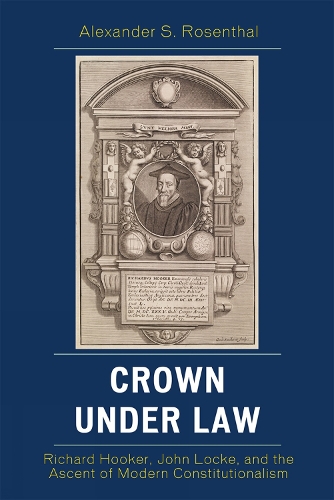
Crown under Law: Richard Hooker, John Locke, and the Ascent of Modern Constitutionalism
(Paperback)
Publishing Details
Crown under Law: Richard Hooker, John Locke, and the Ascent of Modern Constitutionalism
By (Author) Alexander S. Rosenthal
Bloomsbury Publishing PLC
Lexington Books
6th May 2008
United States
Classifications
Tertiary Education
Non Fiction
321.87
Physical Properties
Paperback
358
Width 154mm, Height 229mm, Spine 26mm
526g
Description
Crown under Law is an account of how and why the constitutional idea arose in early modern England. The book focuses on two figuresRichard Hooker and John Locke. Rosenthal represents Hooker as a transitional figure who follows in the medieval natural law tradition even while laying the groundwork for Locke's political thought. The book challenges the influential interpretation of Locke by Leo Strauss (who saw Locke as a radical modernist) by illustrating the lines of continuity between Locke's argument in the Two Treatises of Government and the earlier political tradition represented by Hooker. By illustrating the often distinctive manner in which Hooker addressed the great questions, and how he powerfully affected later developments such as Locke's conception of the state, Rosenthal's Crown under Law establishes the important place of Richard Hooker in the history of political thought.
Reviews
Rosenthal's arguments are carefully reasoned and rich in content. * Ethical Perspectives *
Professor Rosenthal's book is a genuine delight to read. Rosenthal's richly documented study makes a major contribution to the history of political thought in Western Europe, especially in England and other English-speaking countries, including America. In his meticulous effort to set the major writings of both Richard Hooker and John Locke within their own proper historical settings, Rosenthal demonstrates his thorough familiarity with the best modern critical editions of the works of these two English authors. He also demonstrates his mastery of the secondary literature when he addresses some of the most pressing issues being debated by contemporary scholars. These strengths place Rosenthal in the rather unique position of being able to bridge the gap between two disparate fields of scholarly investigation which all too often remain, to the detriment of each, isolated from each other. All scholars engaged in Hooker or Lockean studies are in debt to Rosenthal for writing this book. -- Lee W. Gibbs, Cleveland State University
Author Bio
Alexander S. Rosenthal is a lecturer on political theory at Johns Hopkins University's Advanced Academic Programs in Government.
